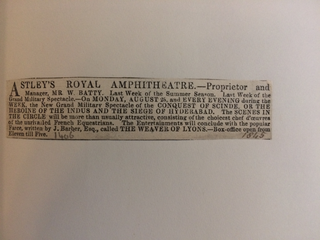Transcription
ASTLEY’S AMPHITHEATRE.
This house reopened last night after one of those brief intervals which theatrical people, naturally given to illusion, are pleased to call a vacation. But Astley’s is part and parcel of Easter Monday; and the town expects it. The evening was begun with “a new grand military spectacle,” called The Maid of Saragossa, or the Spanish Amazons; of which we fear we can only say, we have seen worse pieces, as we have certainly seen better. Of course it turns on the siege of Saragossa by the French; and, including a plot for the betrayal of the place, and sundry conflicts on the battlements and skirmishes in the suburbs, is mainly distinguished by the rush of the Maid of Saragossa into this battle when the besieged were giving way before the for, and her subsequent martial feats. The whole of the first of the two acts of which it consists went off very heavily, particularly the second scene—“awkward recruits”—where the author had so little confidence in his jokes that he put an explanation of them into the mouth of one of his characters, and it had the misfortune generally to come after the laugh was over. The escape of a spy (Mr. Crowther) was very cleverly managed; but when the Maid of Saragossa had to stand over the cannon, waving her country’s flag, the machinery on which she had to step appeared defective, and it made her timid; the effect of this chief feature in the play was lost. The female cavalry told well; and there was more bustle, more of the “pomp and circumstance” of war, sometimes with not the bright side turned towards us, for a procession of litters with wounded men was not particularly pleasing. In the final melée Mrs. Mason’s horse fell with her, but she was immediately rescued unhurt, and the horse was very well able to shift for himself. In truth, the horses are not the worst performers of the company; we go to other houses to see the human actor—we look on this as the house of horses. In the “scenes in the circle” they received and deserved unqualified applause; two admirable little Mexican steeds went through some most elegant and extraordinary performances. Miss Isabelle, a little girl, who will make a splendid horse woman, had rather a stunning fall in bouncing over eight successive ropes in this every limited circle, of course having scarcely time to touch the saddle with her feet after one leap before springing up for the next; the number seems too many for the space. Two new artistes were introduced with entire success,--Madame Dumos, who went through some very graceful and eloquent pantomime on her steed; and M. Dumos, who personated Napoleon in five stages of his career, changing his dress with his horse at full gallop. Mr. Bridges, and the clowns, with the immortal Widdicombe, did their duty well; and the “scenes” never flagged for an instant. The house was well attended, but could scarcely be said to be crowded.
